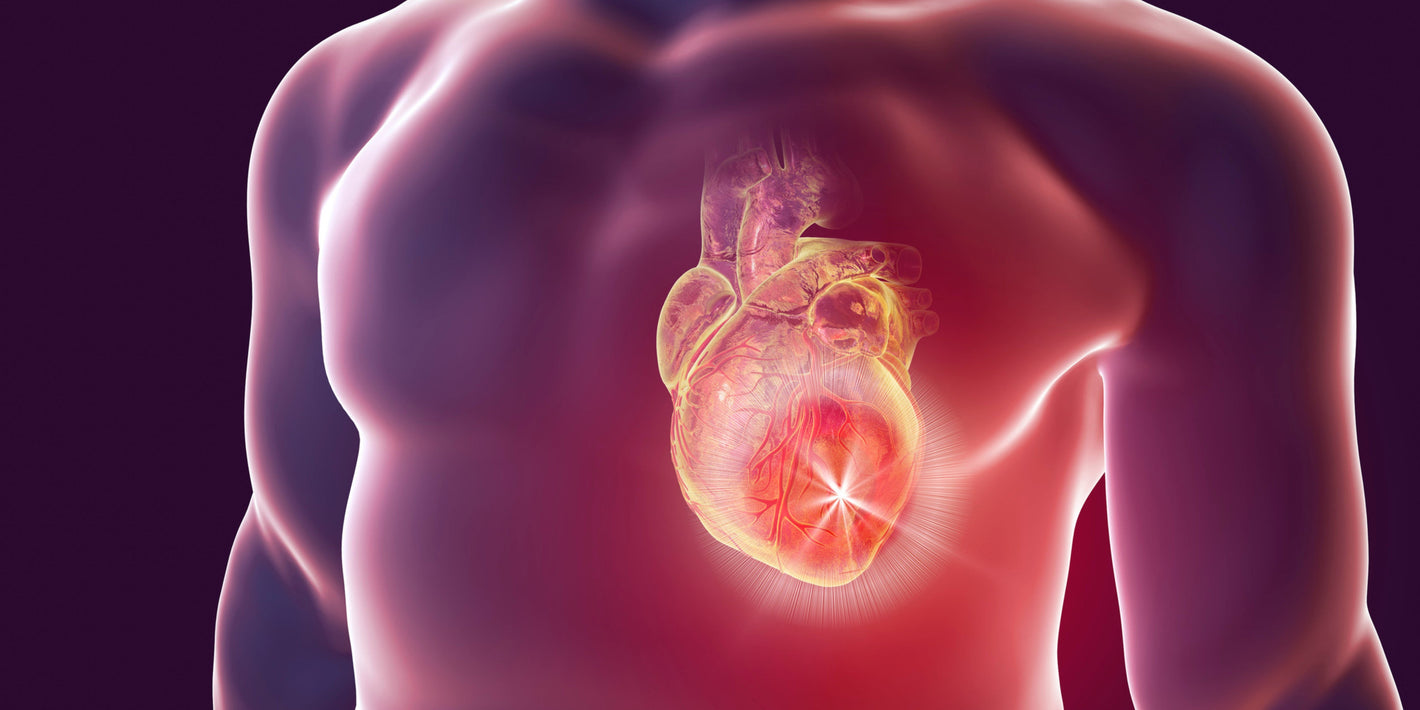
How Magnesium Can Help Prevent and Manage Cardiac Arrhythmia
Cardiac arrhythmia, often referred to as an irregular heartbeat, is a condition that can have serious implications for overall heart health. While many factors contribute to the development of arrhythmias, one essential element that is frequently overlooked is magnesium. This mineral plays a crucial role in maintaining a steady heart rhythm and preventing cardiac arrhythmias. In this comprehensive article, we will explore how magnesium can help prevent and manage cardiac arrhythmias, delving into the science behind its benefits and offering practical advice for incorporating magnesium into your health regimen.
The Role of Magnesium in Heart Health
Magnesium is an essential mineral that is involved in a wide range of bodily functions, including muscle and nerve function, blood sugar control, and blood pressure regulation. When it comes to heart health, magnesium is indispensable for maintaining a regular heart rhythm. This mineral helps regulate the electrical activity of the heart, ensuring that each heartbeat occurs at the proper interval. Without sufficient magnesium, the heart's electrical system can become unstable, leading to irregular heartbeats or arrhythmias.
Magnesium's importance in heart health is underscored by its role in over 300 biochemical reactions within the body. These reactions are crucial for cardiovascular health, as they include processes such as protein synthesis, muscle and nerve function, and blood pressure regulation. Magnesium helps to ensure that the heart muscles can contract and relax properly, preventing the erratic contractions that characterise arrhythmias. Additionally, magnesium helps to stabilise cell membranes, reducing the likelihood of abnormal electrical activity that can trigger an irregular heartbeat.
Moreover, magnesium acts as a natural anti-inflammatory agent. Chronic inflammation is a known risk factor for many cardiovascular diseases, including arrhythmias. By reducing inflammation, magnesium helps to protect the heart from damage and maintain a regular heart rhythm. Its role in vasodilation, or the widening of blood vessels, also helps to improve blood flow and reduce blood pressure, further contributing to overall heart health.
Mechanisms of Magnesium in Regulating Heartbeat
The ability of magnesium to regulate the heartbeat lies in its influence on the movement of calcium and potassium ions within heart cells. Calcium ions are responsible for causing heart muscles to contract, while potassium ions help these muscles relax. Magnesium acts as a natural calcium blocker, preventing excessive calcium influx into heart cells and promoting relaxation. This balance between contraction and relaxation is crucial for maintaining a steady and regular heartbeat.
Magnesium's action as a calcium blocker is particularly important in preventing overexcitation of the heart muscles. When calcium levels are too high, the heart muscles can contract too forcefully and too frequently, leading to arrhythmias. By limiting the amount of calcium that enters the cells, magnesium helps to prevent these excessive contractions and maintain a normal heart rhythm. This mechanism is especially relevant in conditions such as atrial fibrillation, where the heart's upper chambers beat irregularly and out of coordination with the lower chambers.
In addition to its role in calcium regulation, magnesium also plays a crucial part in maintaining the proper function of potassium channels in heart cells. Potassium is essential for the repolarisation phase of the cardiac cycle, where the heart muscle cells reset their electrical state after a contraction. Magnesium helps to ensure that potassium channels function correctly, allowing potassium ions to flow out of the cells and enabling the heart to prepare for the next contraction. This coordination between magnesium, calcium, and potassium is vital for preventing the erratic electrical activity that characterises arrhythmias.
Furthermore, magnesium helps to modulate the autonomic nervous system, which controls the involuntary functions of the body, including heart rate. By influencing the balance between the sympathetic (fight or flight) and parasympathetic (rest and digest) branches of the nervous system, magnesium helps to prevent excessive stimulation of the heart. This balance is crucial for maintaining a steady heart rate and preventing the onset of arrhythmias, especially during periods of stress or physical exertion.
Magnesium Deficiency and Cardiac Arrhythmia

A deficiency in magnesium can significantly increase the risk of developing cardiac arrhythmias. Low levels of magnesium can disrupt the balance of other electrolytes, such as calcium and potassium, which are essential for maintaining a regular heartbeat. Without sufficient magnesium, these electrolytes can become imbalanced, leading to the erratic electrical activity that causes arrhythmias. Recognising and addressing magnesium deficiency is therefore crucial for preventing and managing irregular heartbeats.
Magnesium deficiency can result from various factors, including poor dietary intake, certain medical conditions, and the use of specific medications. Diets high in processed foods and low in fruits, vegetables, and whole grains often lack sufficient magnesium. Medical conditions such as gastrointestinal disorders, diabetes, and chronic kidney disease can also impair the body's ability to absorb or retain magnesium. Additionally, medications like diuretics, which are commonly used to treat high blood pressure, can lead to increased magnesium loss through urine.
The symptoms of magnesium deficiency can vary widely but often include muscle cramps, fatigue, nausea, and heart palpitations. Muscle cramps and spasms are among the earliest signs of magnesium deficiency, as magnesium is essential for muscle relaxation. Fatigue and weakness can occur due to the role of magnesium in energy production and muscle function. Nausea and vomiting may also be present, especially in more severe cases of deficiency. Importantly, heart palpitations or an irregular heartbeat are significant indicators of low magnesium levels and should prompt further investigation.
Preventing magnesium deficiency involves ensuring adequate dietary intake of this essential mineral. Incorporating magnesium-rich foods such as leafy greens, nuts, seeds, whole grains, and legumes into your diet can help maintain healthy magnesium levels. In cases where dietary intake alone is insufficient, magnesium supplements may be recommended. It is essential to consult with a healthcare provider before starting any supplementation, as they can determine the appropriate dosage and monitor for potential interactions with other medications.
Magnesium Supplementation for Arrhythmia Prevention
Supplementing with magnesium can be an effective strategy for preventing and managing cardiac arrhythmias, particularly in individuals with low magnesium levels or existing heart conditions. Numerous studies have shown that magnesium supplements can reduce the frequency of arrhythmias and improve overall heart health. Understanding the appropriate use of magnesium supplements and their benefits is essential for those at risk of arrhythmias.
One of the primary benefits of magnesium supplementation is its ability to restore electrolyte balance and stabilise the heart's electrical activity. By increasing magnesium levels, supplementation can help correct imbalances in calcium and potassium that contribute to arrhythmias. This stabilisation of electrolytes helps to prevent the erratic electrical activity that characterises irregular heartbeats. In addition, magnesium supplements can enhance the relaxation of heart muscles, further reducing the risk of excessive contractions and arrhythmias.
Clinical studies have provided strong evidence supporting the use of magnesium supplements for arrhythmia prevention. For example, a study published in the "Journal of the American College of Cardiology" found that magnesium supplementation significantly reduced the incidence of atrial fibrillation in patients undergoing cardiac surgery. Another study in the "American Journal of Clinical Nutrition" demonstrated that higher dietary magnesium intake was associated with a lower risk of sudden cardiac death. These findings highlight the potential of magnesium supplements to improve heart health and prevent life-threatening arrhythmias.
When considering magnesium supplementation, it is crucial to consult with a healthcare provider to determine the appropriate dosage and form of magnesium. Common forms of magnesium supplements include magnesium oxide, magnesium citrate, and magnesium glycinate. Each form has different absorption rates and potential side effects, so individualised recommendations are important. It is also essential to monitor magnesium levels regularly, as excessive supplementation can lead to hypermagnesemia, a condition characterised by abnormally high magnesium levels that can have adverse effects on health.
Magnesium-Rich Diet for Heart Rhythm Stability
Incorporating magnesium-rich foods into your diet is a natural and effective way to support heart health and maintain a stable heart rhythm. A balanced diet that includes a variety of foods high in magnesium can help ensure adequate intake of this essential mineral. By prioritising magnesium-rich foods, you can reduce the risk of magnesium deficiency and promote overall cardiovascular health.
Leafy greens are among the best dietary sources of magnesium. Vegetables such as spinach, kale, and Swiss chard are not only rich in magnesium but also provide other essential nutrients like vitamins A, C, and K, as well as fiber and antioxidants. These nutrients work together to support heart health by reducing inflammation, lowering blood pressure, and improving overall cardiovascular function. Incorporating leafy greens into salads, smoothies, and cooked dishes can help boost your magnesium intake.
Nuts and seeds are another excellent source of magnesium. Almonds, cashews, pumpkin seeds, and sunflower seeds are particularly high in magnesium. These nutrient-dense foods also provide healthy fats, protein, and other important minerals like zinc and selenium. Snacking on a handful of nuts or adding seeds to your meals can help increase your magnesium levels and support heart health. Additionally, nut butters and seed spreads can be used as a nutritious addition to snacks and meals.
Whole grains such as brown rice, quinoa, and whole wheat are also rich in magnesium. These grains provide complex carbohydrates, fiber, and a range of vitamins and minerals that contribute to overall health. Whole grains have been shown to reduce the risk of heart disease, improve digestion, and help maintain stable blood sugar levels. Including whole grains in your diet can provide a steady source of magnesium and other essential nutrients, supporting a regular heart rhythm and overall cardiovascular health.
Clinical Studies on Magnesium and Cardiac Arrhythmia
The benefits of magnesium in managing cardiac arrhythmias are well-supported by scientific research. Numerous clinical studies have demonstrated the positive effects of magnesium on heart rhythm and overall cardiovascular health. These studies provide valuable insights into the mechanisms by which magnesium can prevent and manage arrhythmias, highlighting its potential as a therapeutic option for individuals at risk.
One notable study published in the "Journal of the American College of Cardiology" investigated the effects of magnesium supplementation on patients undergoing cardiac surgery. The study found that magnesium significantly reduced the incidence of atrial fibrillation, a common type of arrhythmia, in these patients. The researchers concluded that magnesium supplementation could be a valuable strategy for preventing arrhythmias in high-risk populations, such as those undergoing cardiac procedures.
Another study published in the "American Journal of Clinical Nutrition" examined the relationship between dietary magnesium intake and the risk of sudden cardiac death. The study followed over 88,000 women for a period of 26 years and found that higher magnesium intake was associated with a significantly lower risk of sudden cardiac death. The researchers suggested that magnesium's beneficial effects on heart rhythm and overall cardiovascular health could help reduce the incidence of life-threatening arrhythmias.
A meta-analysis published in the journal "Circulation" reviewed the results of multiple studies on magnesium and cardiovascular health. The analysis found that magnesium supplementation was associated with a reduction in the risk of developing atrial fibrillation, particularly in patients with low magnesium levels or existing heart conditions. The researchers concluded that magnesium supplementation could be an effective and low-cost intervention for preventing arrhythmias and improving heart health.
Magnesium's Interaction with Other Electrolytes
Magnesium works in close coordination with other electrolytes, particularly calcium and potassium, to maintain heart rhythm. The balance between these electrolytes is crucial for ensuring the proper function of heart cells and preventing arrhythmias. Understanding how magnesium interacts with calcium and potassium can provide valuable insights into its role in regulating heartbeat and maintaining cardiovascular health.
Calcium and magnesium have an antagonistic relationship, meaning they have opposing effects on heart cells. While calcium promotes muscle contraction, magnesium encourages relaxation. This balance is essential for the normal function of the heart, as it ensures that heart muscles can contract and relax in a coordinated manner. Excessive calcium influx into heart cells can lead to overexcitation and arrhythmias, but magnesium helps to prevent this by blocking calcium channels and reducing calcium entry.
Potassium is another critical electrolyte that works in conjunction with magnesium to regulate heart rhythm. Potassium is essential for the repolarisation phase of the cardiac cycle, where heart muscle cells reset their electrical state after a contraction. Magnesium helps to ensure that potassium channels function correctly, allowing potassium ions to flow out of the cells and enabling the heart to prepare for the next contraction. This coordination between magnesium, calcium, and potassium is vital for preventing the erratic electrical activity that characterises arrhythmias.
The interplay between magnesium and other electrolytes extends beyond their direct effects on heart cells. For example, magnesium helps to regulate the absorption and distribution of calcium and potassium within the body. Magnesium deficiency can lead to imbalances in these electrolytes, increasing the risk of arrhythmias. Conversely, adequate magnesium levels can help maintain the proper balance of calcium and potassium, supporting overall heart health and reducing the likelihood of irregular heartbeats.
Symptoms of Magnesium Deficiency in Relation to Heart Health
Recognising the symptoms of magnesium deficiency is crucial for preventing cardiac arrhythmias and maintaining overall health. Magnesium deficiency can manifest in a variety of ways, with symptoms ranging from mild to severe. Understanding these symptoms can help identify potential deficiencies early and take appropriate steps to address them, thereby reducing the risk of arrhythmias.
Muscle cramps and spasms are among the most common symptoms of magnesium deficiency. Magnesium plays a vital role in muscle relaxation, and a lack of this mineral can lead to involuntary muscle contractions. These cramps often occur in the legs but can affect any muscle group. If you experience frequent or severe muscle cramps, it may be a sign of low magnesium levels, and increasing your magnesium intake through diet or supplementation could provide relief.
Fatigue and weakness are also common indicators of magnesium deficiency. Magnesium is involved in energy production within the body's cells, and insufficient levels can lead to reduced energy and overall weakness. This fatigue can be persistent and may not improve with rest, impacting daily activities and quality of life. Addressing magnesium deficiency can help restore energy levels and improve overall vitality.
Heart palpitations or an irregular heartbeat are significant signs of magnesium deficiency, particularly concerning for heart health. These palpitations can feel like a fluttering or racing heartbeat and may occur sporadically or persistently. If you experience these symptoms, it is essential to seek medical advice to determine if magnesium deficiency is a contributing factor. Increasing magnesium intake can help stabilise heart rhythm and reduce the occurrence of palpitations.
Magnesium and Medication: What You Need to Know
Magnesium supplements can interact with certain medications, making it important to be well-informed before starting supplementation. Understanding these interactions can help ensure that magnesium supplements are used safely and effectively, without causing adverse effects or diminishing the efficacy of other medications. Consulting with a healthcare provider is essential to determine the best approach for incorporating magnesium into your health regimen.
One of the most common interactions occurs between magnesium and blood pressure medications, such as ACE inhibitors, calcium channel blockers, and diuretics. Magnesium can enhance the effects of these medications, potentially leading to excessively low blood pressure (hypotension). Monitoring blood pressure regularly and adjusting medication dosages as needed can help manage this interaction and ensure safe and effective treatment.
Magnesium can also interfere with the absorption of certain antibiotics, such as tetracyclines and fluoroquinolones. These antibiotics can bind to magnesium in the gastrointestinal tract, reducing their absorption and effectiveness. To minimise this interaction, it is recommended to take magnesium supplements and antibiotics at least two hours apart. Consulting with a healthcare provider can provide specific guidance on timing and dosage to ensure optimal effectiveness of both the antibiotics and magnesium supplements.
Additionally, magnesium can interact with medications used to treat osteoporosis, such as bisphosphonates. Similar to antibiotics, these medications can bind to magnesium, reducing their absorption. Taking magnesium supplements and bisphosphonates at different times of the day can help prevent this interaction. Your healthcare provider can offer personalised advice on how to manage these medications and supplements effectively.
Personalised Magnesium Intake for Optimal Heart Health
Determining the appropriate magnesium intake for optimal heart health involves considering various factors, including age, gender, and individual health status. The Recommended Dietary Allowance (RDA) for magnesium provides general guidelines, but individual needs may vary based on specific health conditions and lifestyle factors. Personalised recommendations from a healthcare provider can help ensure that magnesium intake is tailored to support overall heart health and prevent arrhythmias.
For adult men, the RDA for magnesium is 400-420 mg per day, while for adult women, it is 310-320 mg per day. Pregnant and breastfeeding women may require higher intakes to support the increased nutritional needs during these periods. These general guidelines can serve as a starting point, but individual requirements may vary based on factors such as age, activity level, and existing health conditions.
Individuals with specific health conditions, such as cardiac arrhythmias or magnesium deficiency, may benefit from higher magnesium intakes under medical supervision. Healthcare providers can assess magnesium levels through blood tests and recommend appropriate supplementation if needed. Regular monitoring of magnesium levels can help ensure that supplementation is effective and safe, preventing both deficiency and excess.
Lifestyle factors, such as diet, exercise, and stress levels, can also influence magnesium needs. A balanced diet rich in magnesium-containing foods can help maintain adequate levels, but supplementation may be necessary in cases of increased physical activity or stress. Ensuring proper hydration and avoiding excessive alcohol consumption can also support magnesium balance and overall heart health.
Summary
Role in Heart Health:
- Magnesium is essential for muscle and nerve function, blood sugar control, and blood pressure regulation.
- It helps regulate the heart's electrical activity, ensuring a steady heartbeat.
- Acts as a natural anti-inflammatory and promotes vasodilation.
Mechanisms of Heartbeat Regulation:
- Magnesium influences calcium and potassium ion movement in heart cells, promoting muscle relaxation and preventing overexcitation.
- Helps potassium channels function correctly for proper heart muscle repolarisation.
- Modulates the autonomic nervous system to maintain a balanced heart rate.
Deficiency and Arrhythmia:
- Low magnesium levels disrupt electrolyte balance, increasing arrhythmia risk.
- Common causes include poor diet, certain medical conditions, and specific medications.
- Symptoms of deficiency include muscle cramps, fatigue, nausea, and heart palpitations.
Supplementation for Prevention:
- Magnesium supplements can restore electrolyte balance and stabilise heart activity.
- Clinical studies show reduced arrhythmia incidence with magnesium supplementation.
- Consultation with healthcare providers is essential for appropriate dosage and monitoring.
Magnesium-Rich Diet:
- Foods high in magnesium: leafy greens, nuts and seeds, whole grains, legumes, and certain fruits.
- A balanced diet can help maintain healthy magnesium levels and support heart rhythm.
- Promotes overall cardiovascular health by reducing inflammation and improving blood flow.
Clinical Studies:
- Research shows magnesium supplementation reduces atrial fibrillation in cardiac surgery patients.
- Higher dietary magnesium intake is linked to a lower risk of sudden cardiac death.
- Meta-analyses confirm magnesium's effectiveness in reducing arrhythmia risk.
Interaction with Other Electrolytes:
- Magnesium balances calcium and potassium to regulate heart function.
- Prevents excessive calcium influx and ensures proper potassium channel function.
- Maintains overall electrolyte balance crucial for preventing arrhythmias.
Symptoms of Deficiency:
- Muscle cramps, fatigue, nausea, and heart palpitations are key indicators.
- Early recognition and dietary adjustments or supplementation can prevent arrhythmias.
Personalised Intake:
- Recommended Dietary Allowance (RDA) varies by age, gender, and health status.
- Individualised recommendations based on specific needs and conditions.
- Regular monitoring and lifestyle adjustments support optimal magnesium levels and heart health.
Magnesium Information
For everything you need to know about magnesium and magnesium supplements, check out our comprehensive information page here.
Magnesium
We’ve created a magnesium supplement with a combination of three types of highly absorbable magnesium at a therapeutic dose. Our magnesium comes as an easy to mix, great tasting powder to ensure optimal absorption. To learn more about our magnesium, check out the product page here.







